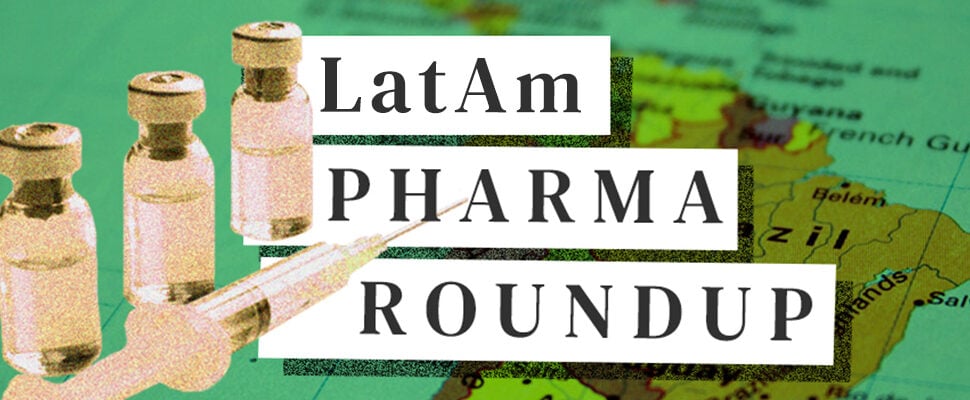A roundup of some of the latest news from Latin American pharma, including Acino’s acquisition of M8 Pharmaceuticals; AstraZeneca’s growth in Mexico; Neuraxpharm’s expansion into Brazil and Mexico, and Columbia’s decision to issue a compulsory license for GSK/ViiV’s HIV treatment.
Colombia set to issue a compulsory license for an HIV medicine sold by GSK’s ViiV (STAT)
In the latest battle over access to medicines, Colombian authorities have decided to issue a compulsory license for a needed HIV treatment, a step that underscores ongoing friction between the pharmaceutical industry and cash-strapped governments around the world.
By issuing such a license, the Colombian government hopes to obtain lower-cost generic versions of an HIV medicine called dolutegravir, which is made by ViiV Healthcare, a company that specializes in HIV treatments and is largely controlled by GSK. The treatment is known commercially as Tivicay, or as Dovato when combined with other medicines.
Acino significantly expands presence and capabilities in Latin America through acquisition of M8 Pharmaceuticals (Global Newswire)
Acino, a Swiss pharmaceutical company headquartered in Zurich, today announced that it has entered into an agreement to acquire M8 Pharmaceuticals (M8), a fast-growing specialty biopharmaceutical company, headquartered in Mexico City and focused on licensing, marketing, and distributing innovative and established medicines in Mexico and Brazil.
Through this acquisition, Acino will enter the two largest pharmaceutical markets in Latin America, significantly expanding its geographic footprint and strengthening its position in the region, providing a more powerful and comprehensive offering for healthcare professionals and patients. The acquisition will complement Acino’s existing Latin American division, which is based in Panama and operates across eight countries in Central America, the Caribbean, and Ecuador, delivering high-quality medicines to improve people’s health in this key region.
Lula aims to establish Brazil as pharmaceutical bellwether to South America (Pharmaceutical Technology)
In stark contrast to previous Brazilian President Jair Bolsonaro’s isolationist policies, President Lula da Silva has taken steps to revive the Union of South American Nations, or UNASUR, in a bid to drive pharmaceutical trade and raise disease response standards across the region.
Lula convened the first South America Summit in nearly a decade. All twelve leaders in attendance signed the Brasilia Consensus, pledging cooperation on a variety of agendas including increased investment and market access, and the elimination of unilateral trade measures. The Consensus also stated the aim of “reaching an effective South America Free Trade Area” similar to the EU, within which medical imports and exports will be a key component.
Boehringer Ingelheim Mexico celebrates 50 years of production in Xochimilco (Vertigo Politico, in Spanish)
Boehringer Ingelheim, an industry-leading family-owned pharmaceutical company, proudly celebrates the fiftieth anniversary of the start of its operations at the Xochimilco manufacturing site, south of Mexico City, and reaffirms its commitment to the health of humans, animals and the environment, being a clear example of the “One Health”1 or “One Health” concept.
The production site, which is part of the global network of manufacturing complexes that the German company has around the world, began operations in 1973, standing out as a beacon of excellence and achieving a current annual production of +1,200 million tablets and 40 million units. In this way, it is a strategic center for the production of oral solids and the global manufacturing of medications to treat type 2 diabetes mellitus.
AstraZeneca grows at a rate of 30% and rises to #1 in Mexico (El Economista, in Spanish)
AstraZeneca brings an accelerated pace of growth in Mexico, surpassing the entire sector. At a rate of 30 percent annual expansion in its sales, said pharmaceutical company is planning to end the year as the number one in the country in the prescription market.
And this is not just anything because, if achieved, it will simply be surpassing giants such as Pfizer, Sanofi and Bayer in said specialized ranking of the pharmaceutical sector. AstraZeneca has done something right as it is today among the 10 most valuable pharmaceutical brands in the world.
Rolf Hoenger, from Roche: “The Argentine health system needs more efficiency, not more budget” (Forbes Argentina, in Spanish)
The director for Latin America of the pharmaceutical company explains the challenges that countries have in facing more advantaged populations and at the same time with greater quality and well-being of life. The company, which had a turnover of more than USD 70 billion globally, allocated almost 20 percent of its sales to R&D last year.
More than a decade ago Roche, the world’s largest Swiss pharmaceutical company, spun off its non-prescription products division (where one of its iconic brands such as Redoxon was) and focused on complex diseases. From that moment on, he made a greater commitment to scientific research and the search for new molecules for medicines through biotechnology. In Argentina, it has been present for 93 years. It was the first country to open a subsidiary in Latin America and currently represents 1.5% of the clinical trials it carries out in the world. Roche Argentina is the No. 1 laboratory in the number of clinical trials initiated in the last 5 years in the country: it is running 61 interventional trials, mainly in oncology (33 percent), ophthalmology, neurology, immunology, respiratory and infectious diseases with about 700 patients active in more than 190 centers, including public institutions.
Neuraxpharm expands outside Europe into Brazil and Mexico (Pharmaceutical Manufacturer)
Neuraxpharm Group (Neuraxpharm), a leading European specialty pharmaceutical company focused on the treatment of central nervous system (CNS) disorders, announces the establishment of affiliates in Brazil and Mexico, the two largest pharmaceutical markets in Latin America, as first steps in its expansion outside of Europe.
As part of the expansion into Brazil, Neuraxpharm has acquired Libber Pharma, a company that can provide the infrastructure to distribute and commercialise Neuraxpharm products across the country. The acquired company has been renamed Neuraxpharm Brazil. In addition, Neuraxpharm completed the acquisition earlier this year of Sanofi’s portfolio of CNS products which includes one neuroleptic and three antipsychotic products in Brazil which will form part of the product expansion.



